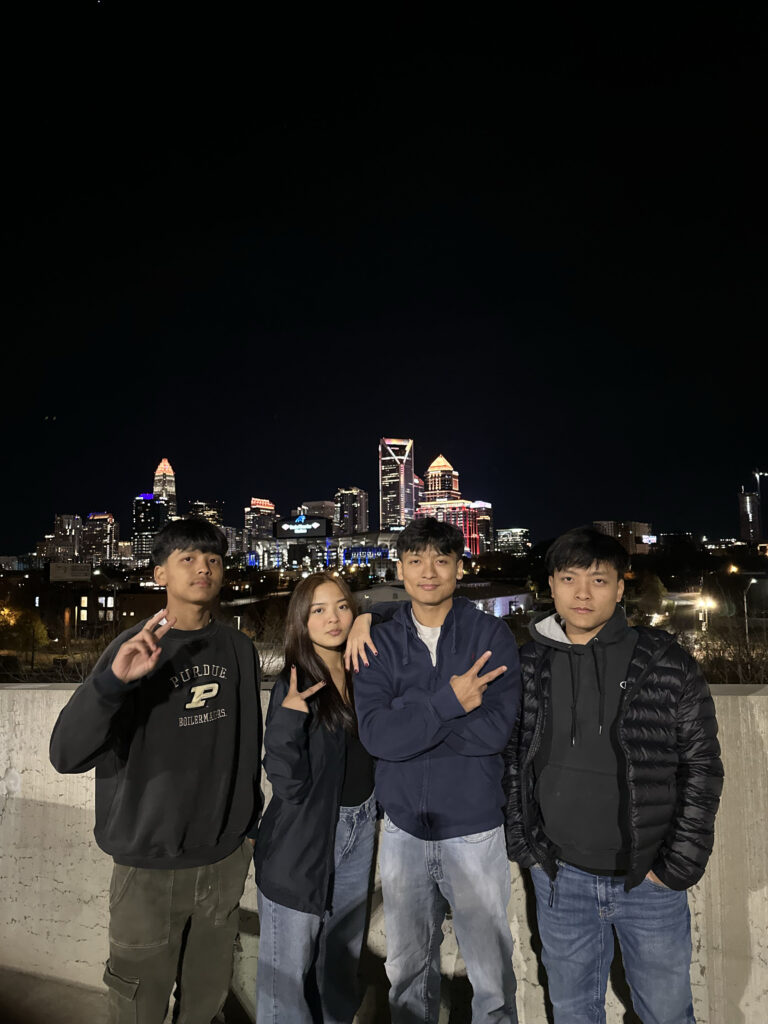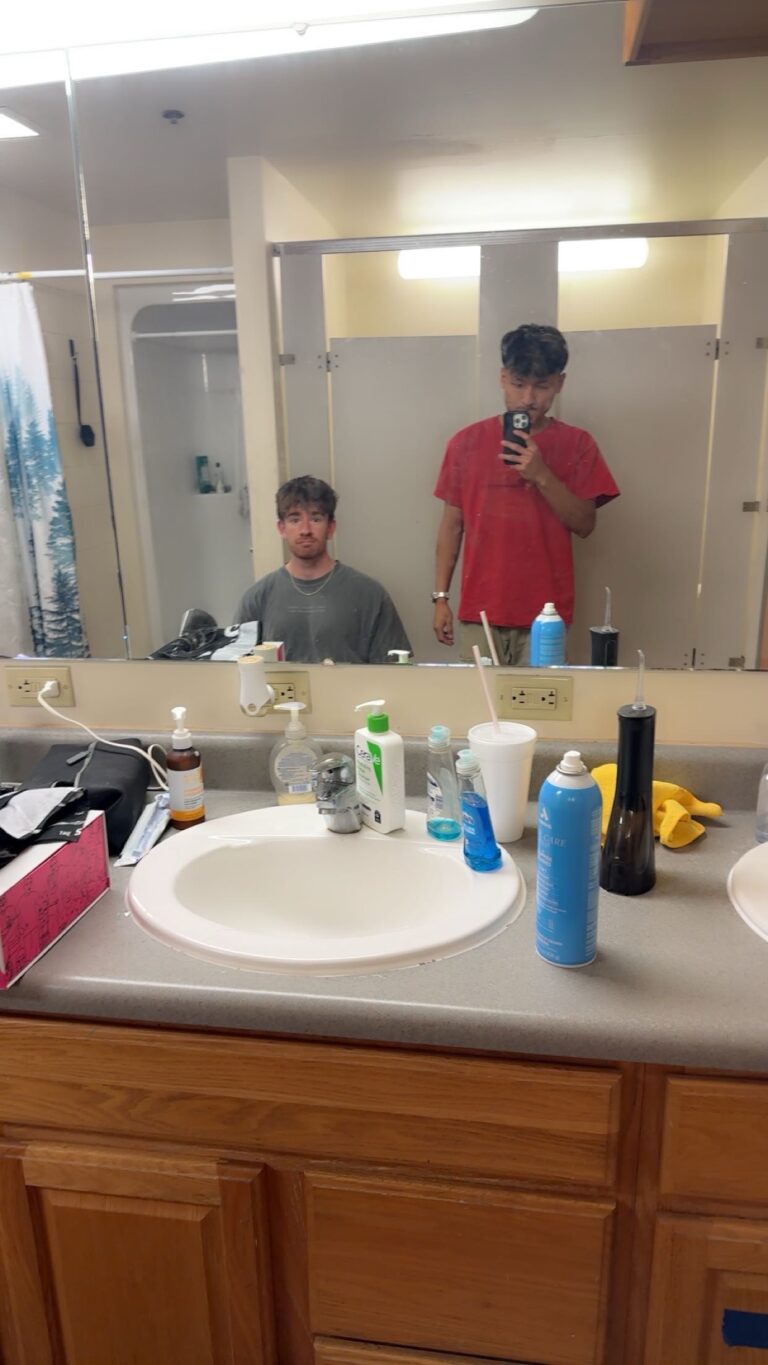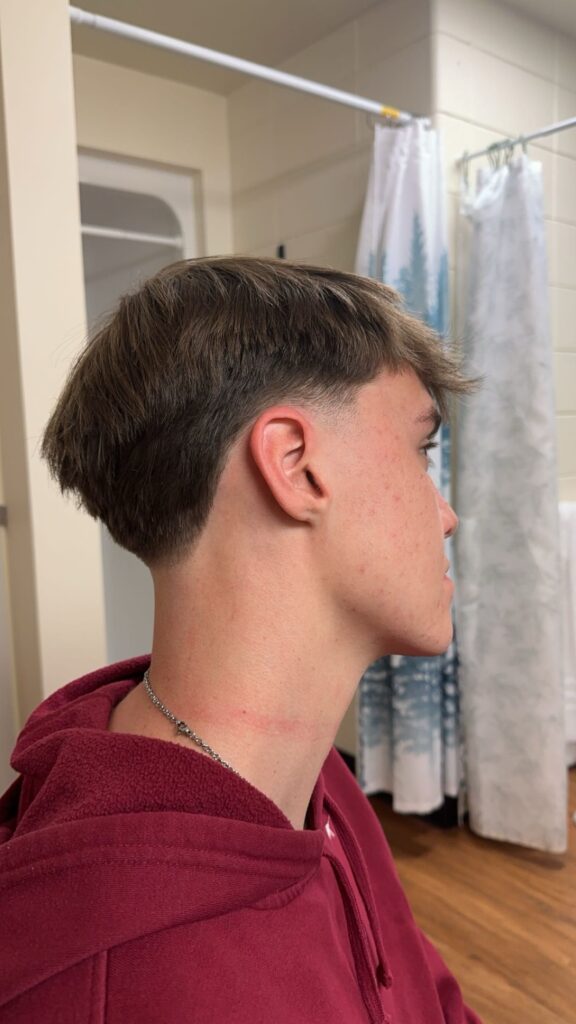Voice for the Voiceless - Johnny's Story
Listen to to the first three paragraphs in Burmese
Audio PlayerSitting in Johnny’s makeshift barber chair in his dorm room bathroom, I found myself looking at a mirror, not just to see my reflection, but to see the world through his eyes. Johnny is one of those people whose passion shines through the moment you meet them. He dreams of becoming a barber, and even though Indiana Wesleyan University is far from a barbering school, his small collection of clippers and combs is proof that he’s pursuing his dream one haircut at a time.
As he worked on my hair, I asked Johnny about his journey, starting with how he got into barbering. “It started with my cousins,” he said with a smile. “Back home in North Carolina, I used to cut their hair just for fun. Then, people started saying I was good, so I kept practicing. I started watching YouTube videos, learning techniques, and trying new styles.” His hands moved steadily, and I could tell he was proud of the craft he had taught himself. However, when I asked about his experience at IWU, his smile faded just a little. “It’s hard here,” he admitted. “There’s no one to really help me with barbering. Like, no programs or even a place where I can set up and cut hair for people. I feel like my dream is on pause, you know?”
Johnny’s voicelessness isn’t about being quiet or shy. He speaks two languages, English and Burmese. It’s the lack of understanding and recognition of his cultural identity and dreams that makes him feel invisible. “A lot of people don’t even know I speak Burmese,” he said. “When I tell them, they’re surprised. But it’s who I am. It’s my first language. It’s how I talk to my family, my uncle, and the people at my church in Indianapolis.” Every weekend, Johnny makes a two-hour trip to Indianapolis to stay with his uncle and attend a Burmese-speaking church. “That’s the only time I really feel at home,” he said, carefully trimming the edges of my hair. “I love IWU, but it feels like no one really understands my culture here. And because of that, I feel like people don’t really see the whole me.”
When I asked him how IWU could better incorporate his culture into everyday life, he didn’t hesitate. “I wish there were more ways to share who I am,” he said. “Even something simple like an international cultural week, where students can talk about their backgrounds, share food, music, and traditions. It would help people like me feel proud of who we are.”
Johnny also suggested that IWU could offer resources for bilingual students to celebrate their languages. “I’d love to see something like a Burmese language class or even just a space where we can share our languages with others,” he said. “It’s not just about me speaking Burmese; it’s about other students learning from me and me learning from them. That kind of exchange would help people see us for who we really are.”
He shared how it can be difficult to navigate a campus where there is not as much visible acknowledgment of his culture. “Even in the dining hall,” he said, “it would be so cool to have meals from different countries once in a while. Like Burmese food—our curries, rice, and soups. If people could taste something from my culture, it would be a way to connect without needing words.” Johnny believes these changes would not just help him but would also enrich the entire campus community. “It’s not just about me being seen,” he said. “It’s about everyone feeling like they belong here, no matter where they’re from or what language they speak.”
On campus, Johnny’s barbering talent is another part of him that goes unnoticed. “I try to tell people I cut hair,” he said, “but it’s hard to find customers. Most people don’t know I do this. And without customers, I don’t get practice. It’s like…I have this thing I love to do, but I can’t grow in it because no one gives me the chance.” By this point in the haircut, I could tell Johnny was not just good at barbering, but rather exceptional. After he finished my fade, I asked him what one of his big goals was. “I want to get my barber’s license,” he told me. “That’s my goal. But it feels so far away. I don’t know where to start, and IWU doesn’t really have anything to help someone like me.” Despite these challenges, Johnny hasn’t given up. “I’m still learning,” he said. “Every haircut teaches me something new. And even if I don’t have a lot of customers, I still love it. I love making people feel good about how they look.”
When I asked what he wanted people to know about him, Johnny said, “I just want people to see me. Not just as a student, but as someone who has a passion and a culture. I want them to know I’m serious about being a barber, that it’s not just a hobby for me. It’s my dream.”
By sharing his story, I hope more people at IWU can see Johnny as a skilled barber with a big dream, a Burmese speaker who bridges two cultures, and a young man who just wants to be recognized and supported. Johnny’s voice deserves to be amplified, not just through words, but through actions that help him grow his passion and connect with the community.
When I walked out of his dorm room that day, I realized how much potential I had to help him through my roles as a Resident Assistant (RA) and the Student Director of Videography for Student Involvement. Johnny’s story is one that deserves to be heard, and I have the tools to make his voice heard in ways that could make a real difference.
As an RA, my job is to foster community and create a space where all residents feel valued and understood. Johnny’s story opened my eyes to how I could do this by intentionally incorporating cultural appreciation into dorm life. One of the first ideas I had was to host a Cultural Connections Night where students like Johnny could share their culture through food, language, and stories. Johnny could demonstrate some basic Burmese phrases or even bring a dish from his culture to share with the hall. By giving him and others the spotlight, I could help foster a deeper understanding and appreciation among residents. Within the dorm, I could also create a little poster for the hall bulletin board or use our group chat to highlight talents and skills students offer. Featuring Johnny’s barbering services with a brief write-up about his passion could help him connect with potential customers.
In my role as the Director of Videography for Student Involvement, I have the opportunity to reach a much larger audience with my video and editing skills as well as the video equipment I have the privilege of using. Johnny’s story is perfect for a short documentary or video feature that showcases his life, his dreams, and his challenges. I could film him in action doing things like cutting hair, speaking about his passion, and reflecting on his cultural roots. Including footage of his weekend trips to Indianapolis to attend a Burmese-speaking church would give viewers a deeper understanding of his connection to his culture. Through this project, I could also highlight his bilingualism as a strength, showing how his ability to speak both Burmese and English bridges two worlds. Sharing the video with others could help Johnny connect with more people and gain both customers and recognition. Through my work, I hope to not only amplify his story, but also create a campus culture where every student feels recognized for who they are and what they bring to the table.



